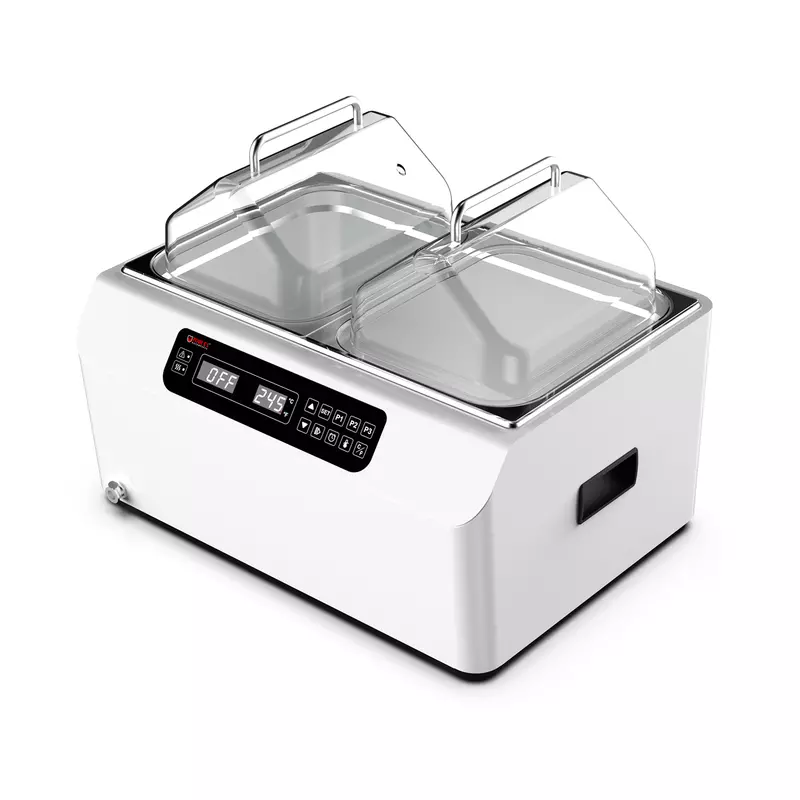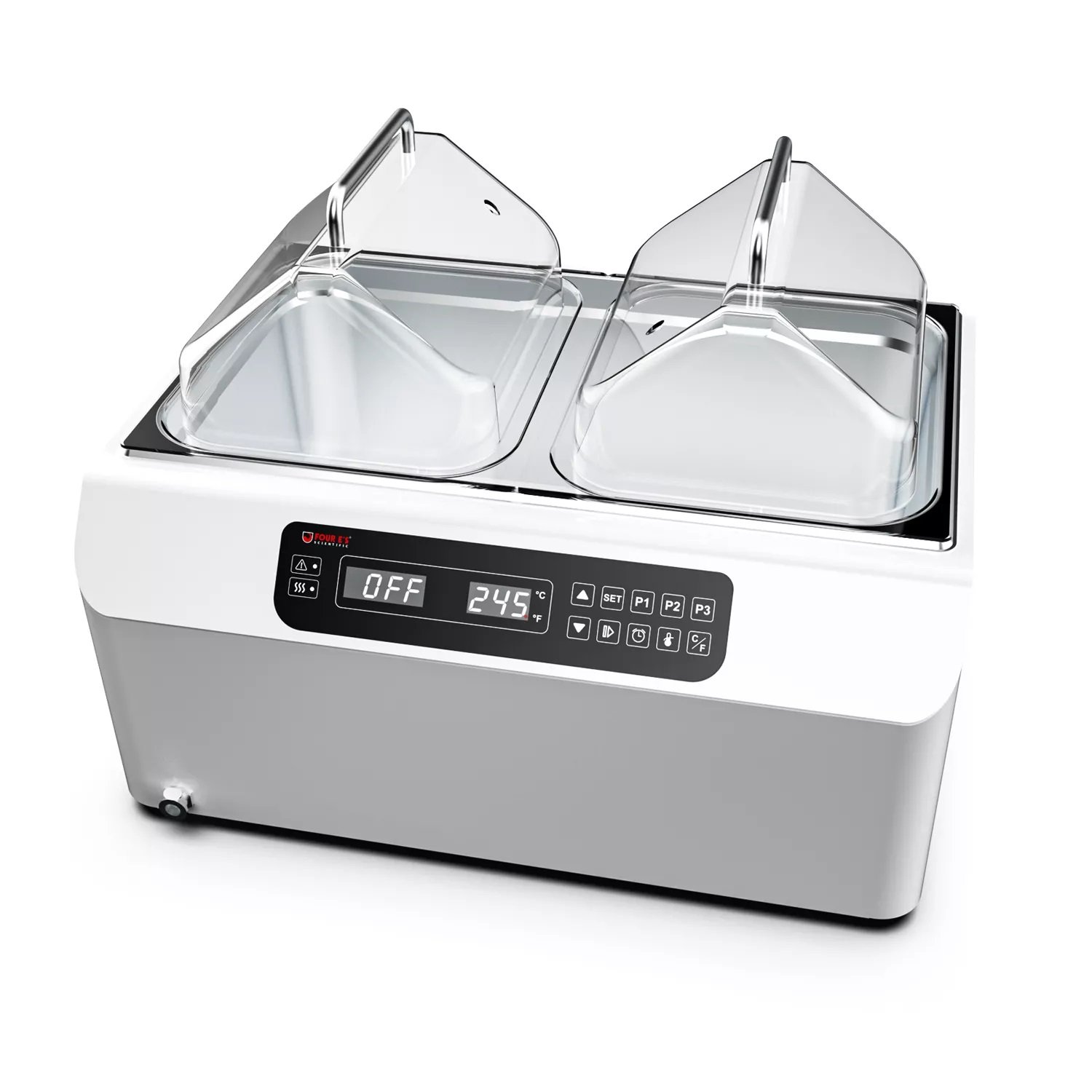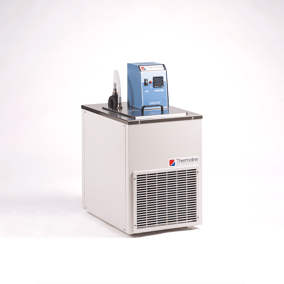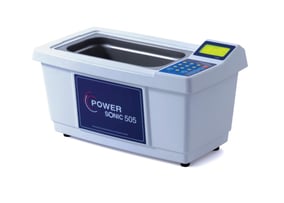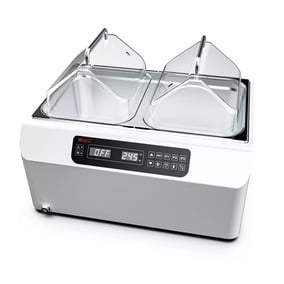Circulated Water Bath (Built-in pump) TWB-24CP-4E
In contrast to an uncirculated water bath, a circulated water bath uses a pump to circulate the water within the bath, ensuring that the temperature is consistent across the entire bath.
This digital heated water bath features an in-built pump, so no additional external heater circulator is required.
Overview
Thermoline's circulated laboratory water bath offers several advantages over uncirculated water baths. Circulating the water helps distribute heat evenly throughout the bath, minimising temperature gradients or hot spots and providing more precise and uniform temperature control. This makes the Thermoline circulated water bath ideal for applications requiring highly precise temperature control, such as DNA amplification by polymerase chain reaction (PCR).
Advantages of Circulated Water Baths:
- Uniform Temperature Control: Circulating water ensures even heat distribution, preventing temperature gradients and hot spots.
- Enhanced Precision: Ideal for tasks requiring highly precise temperature control.
- Versatility: Suitable for a wide range of laboratory applications, including chemistry, biology, and biotechnology.
Typical Applications:
- Incubating Cells: Maintaining optimal conditions for cell growth and culture.
- Sample Thawing: Gently thawing frozen samples without rapid temperature changes.
- Chemical Reactions: Conducting reactions at specific, stable temperatures.
- PCR and DNA Amplification: Providing precise temperature control for PCR processes.
- General Laboratory Tasks: Versatile use in various experimental and testing procedures.
TWB-24CP-4E Circulated Water Bath:
- Size: Available in a 24L size only.
- Perforated False Floor: Sits above the base to protect samples from direct contact with the heater.
- Convenient Handles: Easy to move with carry handles.
- Easy Drainage: Simple-to-use drain for water removal and tank cleaning.
Laboratory uncirculated water baths are essential tools in various scientific and industrial applications due to their ability to provide a stable and controlled temperature environment. Here are some of the common uses:
-
Sample Thawing:
- Gently thawing frozen samples without subjecting them to rapid temperature changes, preserving sample integrity.
- Gently thawing frozen samples without subjecting them to rapid temperature changes, preserving sample integrity.
-
Bacteriological Examinations:
- Incubating cultures at specific temperatures for bacterial growth and testing.
- Incubating cultures at specific temperatures for bacterial growth and testing.
-
Reagent Warming:
- Pre-warming reagents to desired temperatures before use in experiments, ensuring consistency in reactions.
- Pre-warming reagents to desired temperatures before use in experiments, ensuring consistency in reactions.
-
Coliform Determinations:
- Incubating water samples at controlled temperatures to test for coliform bacteria, crucial in water quality testing.
- Incubating water samples at controlled temperatures to test for coliform bacteria, crucial in water quality testing.
-
Microbiological Assays:
- Providing a stable temperature environment for various microbiological tests and assays.
- Providing a stable temperature environment for various microbiological tests and assays.
-
Tissue and Cell Culture:
- Maintaining consistent temperatures for the growth and maintenance of cell and tissue cultures.
- Maintaining consistent temperatures for the growth and maintenance of cell and tissue cultures.
-
Protein Crystallization:
- Creating a controlled environment for the crystallization of proteins, an important step in structural biology.
- Creating a controlled environment for the crystallization of proteins, an important step in structural biology.
-
Enzyme Reactions:
- Incubating enzyme-substrate reactions at optimal temperatures to ensure accurate results.
- Incubating enzyme-substrate reactions at optimal temperatures to ensure accurate results.
-
Pharmaceutical Testing:
- Conducting stability tests and dissolution testing of pharmaceutical products at controlled temperatures.
- Conducting stability tests and dissolution testing of pharmaceutical products at controlled temperatures.
-
Food and Beverage Industry:
- Performing quality control tests, including checking the stability and reactions of various food and beverage samples.
- Performing quality control tests, including checking the stability and reactions of various food and beverage samples.
-
Chemical Reactions:
- Maintaining consistent temperatures for chemical reactions that require precise thermal conditions.
- Maintaining consistent temperatures for chemical reactions that require precise thermal conditions.
-
General Lab Use:
- Providing a versatile temperature-controlled environment for various general laboratory applications.
Additional Applications in Commercial Kitchens:
- Sous Vide Cooking:
- Maintaining precise temperatures for sous vide cooking, a method that involves cooking food in vacuum-sealed bags submerged in water at controlled temperatures for extended periods.
Trust Thermoline for high-quality, reliable laboratory water baths that enhance your productivity and meet your precise application needs.
Specifications
- Dimensions
-
TWB-24CP-4E External WxDxH (mm) 560x414x426
(including lid)Internal WxDxH (mm) 500x300x200 - Technical Specifications
-
TWB-24CP-4E Temperature Range Ambient +5°C to 99°C (max temp with
bath lid on)Temperature Stability +/-0.1°C LED Display Resolution 0.1°C Electrical 1225W/230V Capacity 24L Weight 16.5kgs - Features
-
TWB-24CP-4E Timer Setting Range 1min - 99h 59min Included Lids 2 Dry Break Drain ✔ - Safety
-
TWB-24CP-4E Dry-start Protection ✔ Over Temperature Safety ✔
Downloads
Support & FAQs
At Thermoline, we strive to supply helpful customer support to ensure that you get the most out of our products. We are committed to providing whatever support our customers need, wherever they are in the world. If you can't find your solution in the below FAQs or Knowledge Base, please contact our friendly support team.

